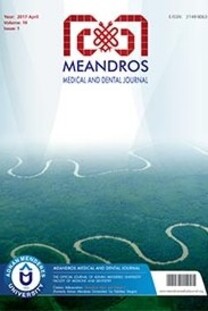İNHALASYON HASARINDA NONİNVAZİV POZİTİF BASINÇLI VENTİLASYONUN YOĞUN BAKIM ÜNİTESİNDE KLİNİK SÜRECE ETKİLERİ
AMAÇ: İnhalasyon hasarı akut akciğer hasarıdır ve mortaliteyi artırır. İleri derecede akut solunum yetmezliği olan hastalara sıklıkla entübasyon ve invaziv mekanik ventilasyon (İMV) desteği gerekmekte, ancak bu yöntem trakeal stenoz, ventilatör ilişkili pnömoni, barotravma gibi komplikasyonlara neden olabilmektedir. Hafif/orta derecede hasarda ise klasik medikal destek tedaviler uygulanmakta, solunum yetmezliğinin ilerlemesi durumunda invaziv yöntemlere başvurulmaktadır. Son çalışmalarda hafif/orta derecede hasarı olan hastalarda erken dönem noninvaziv mekanik ventilasyon uygulamasının, invaziv yöntem gereksinimini azalttığı gösterilmiştir. GEREÇ ve YÖNTEM: Çalışmamızda klasik medikal tedavi (MT) yöntemleri ile bu yöntemlerle birlikte uyguladığımız noninvaziv mekanik ventilasyonun (NIMV) yoğun bakım ünitesinde iyileşme sürecine etkilerini değerlendirdik.BULGULAR: NIMV'un MT'ye göre entübasyon ve re-entübasyon gereksinimini azalttığı ve iyileşme sürecini anlamlı olarak azalttığı gözlenmiştir (p < 0.05). SONUÇ: Erken dönemde başlanan NIMV desteğinin İMV gereksinimini azaltmada, maske ile oksijenasyonun önleyemediği atelektazi gelişimini ve hipoksiyi önlemede, klinik ve yanık iyileşme süreçlerini kısaltmada etkin ve güvenilir bir yöntem olduğunu söyleyebiliriz
Effects on Intensive Care Unit Clinical Course of Non-invasive Mechanical Ventilation in Inhalation Injury
OBJECTIVE: Inhalation injury is a form of acute lung damage and increases mortality. Intubation and invasive mechanic ventilatory (IMV) support is frequently needed in patients with advanced acute pulmonary failure, however, this procedure can lead to complications including tracheal stenosis, ventilator related pneumonia, and barotraumas. For minor / moderate damages, traditional medical support modalities are preferred, however, in cases where respiratory failure worsens; invasive approaches are the choice of the procedure. Recent studies showed decrease at the need to invasive modalities in patients with minor/moderate pulmonary failure by early term non-invasive mechanic ventilatory support (NIMV) application. MATERIALS and METHODS: In our study, traditional medical treatment modalities (MT) were compared with the addition of NIMV support to traditional modalities in their effects on the clinical course at the intensive care unit. RESULTS: NIMV compared with medical therapy, reduce the need for intubation and re-intubation and significantly reduced the healing process was observed (p < 0.05). CONCLUSION: NIMV initiated at early phase is an effective and reliable choice of procedure to decrease the need to IMV, to prevention atelectasis and hypoxemia that oxygenation with mask is ineffective, and to improve burn wound healing time and clinical course.
___
- Smith DL, Cairns BA, Ramadan F, Dalston JS, Fakhry SM, Rutledge R, Meyer AA, Peterson HD. Effect of inhalation injury, burn size, and age on mortality: a study of 1447 consecutive burn patients. J Trauma 1994;37:655-9. 2. Mlcak RP, Suman OE, Herndon DN. Respiratory management of inhalation injury. Burns 2007;33(1):2- 13. 3. Fitzpatrick JC, Cioffi WG Jr. Ventilatory support
